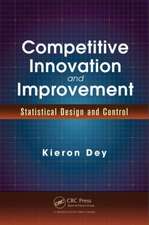Subject-Oriented Business Process Management
Autor Albert Fleischmann, Werner Schmidt, Christian Stary, Stefan Obermeier, Egon Börgeren Limba Engleză Hardback – noi 2012
between the people involved. The sentences used to communicate are naturally structured by subject, verb, and object. The subject describes the actor, the verb the action and the object what is affected by the action. Subject-oriented Business Process Management (S-BPM) as presented in this book is based on this simple structure which enables process-oriented thinking and process modeling.
S-BPM puts the subject of a process at the center of attention and thus
deals with business processes and their organizational environment from a new perspective, meeting organizational requirements in a much better way than traditional approaches. Subjects represent agents of an action in a process, which can be either technical or human (e.g. a thread in an IT system or a clerk). A process structures the actions of each subject and coordinates the required communication among the subjects. S-BPM provides a coherent procedural framework to model and analyze business processes: its focus is the cooperation of all stakeholders involved in the strategic, tactical, and operational issues, sharing their knowledge in a networked structure.
The authors illustrate how each modeling activity through the whole development lifecycle can be supported through the use of appropriate software tools. The presentation style focuses on professionals in industry, and on students specializing in process management or organizational modeling. Each chapter begins with a summary of key findings and is full of examples, hints, and possible pitfalls. An interpreter model, a toolbox, and a glossary summarizing the main terms complete the book. The web site www.i2pm.net provides additional software tools and further material.
| Toate formatele și edițiile | Preț | Express |
|---|---|---|
| Paperback (1) | 365.42 lei 6-8 săpt. | |
| Springer Berlin, Heidelberg – 14 dec 2014 | 365.42 lei 6-8 săpt. | |
| Hardback (1) | 371.68 lei 6-8 săpt. | |
| Springer Berlin, Heidelberg – noi 2012 | 371.68 lei 6-8 săpt. |
Preț: 371.68 lei
Preț vechi: 464.59 lei
-20% Nou
Puncte Express: 558
Preț estimativ în valută:
71.13€ • 73.81$ • 59.45£
71.13€ • 73.81$ • 59.45£
Carte tipărită la comandă
Livrare economică 15-29 martie
Preluare comenzi: 021 569.72.76
Specificații
ISBN-13: 9783642323911
ISBN-10: 364232391X
Pagini: 392
Ilustrații: XVI, 376 p.
Dimensiuni: 155 x 235 x 27 mm
Greutate: 0.72 kg
Ediția:2012
Editura: Springer Berlin, Heidelberg
Colecția Springer
Locul publicării:Berlin, Heidelberg, Germany
ISBN-10: 364232391X
Pagini: 392
Ilustrații: XVI, 376 p.
Dimensiuni: 155 x 235 x 27 mm
Greutate: 0.72 kg
Ediția:2012
Editura: Springer Berlin, Heidelberg
Colecția Springer
Locul publicării:Berlin, Heidelberg, Germany
Public țintă
Professional/practitionerCuprins
Thinking of Business Processes Systematically.- From Language Acquisition to Subject-oriented Modeling.- The Integrated S-BPM Process Model.- Subject-oriented Process Analysis.- Modeling Processes in a Subject-Oriented Way.- Subject-Oriented Modeling by Construction and Restriction.- Subject-oriented Validation of Processes and Process Models.- Subject-oriented Optimization of Processes.- Organization-specific Implementation of Subject-oriented Processes.- IT-Implementation of Subject-Oriented Business Processes.- Subject-oriented Monitoring of Processes.- A Precise Description of the S-BPM Modeling Method.- Tools for S-BPM.- S-BPM Method by Comparison.- Conclusion.- A Subject-Oriented Interpreter Model for S-BPM.
Notă biografică
Albert Fleischmann is founder and scientific advisor of Metasonic AG. Prior to this role he was CEO of the company from its founding in 2004 until 2009. As a result of his work as a consultant, he has acquired many years of experience in process management. In 2003 he was a member of the rating board for the European Quality Award. Before becoming a consultant, Albert Fleischmann worked for various international hardware manufacturers in the areas of research, service, and sales. His focus was on the development and implementation of distributed software systems and the description and implementation of business processes in particular. He has written several books and various articles on these topics. Albert Fleischmann studied Business Information Systems at the University of Erlangen-Nuremberg, Germany where he also did his ph.d.
Werner Schmidt is a Professor for Business Information Systems at the University of Applied Sciences in Ingolstadt, Germany. After completing an apprenticeship as a Data Processing Management Assistant, he studied Business Administration (with Majors in Business Information Systems and Business Management) at the University of Erlangen-Nuremberg und also did his ph.d. there in Business Information Systems. Subsequently, he worked for several years in software development. His main focus in the area of research and development is on – just as it was during his entire vocational and academic career – the management of processes and their associated support through IT. The second coterminous field of engagement is IT management. Both areas of focus are mirrored in his work as editor and author of various publications, as well as his scientific consultancy for respective practical projects.
Christian Stary is a Professor for Business Information Systems at the University of Linz, Austria. He studied Computer Sciences at the Technical University of Vienna, Austria, where he also completed his dissertation (1988) and habilitation (1993). In addition, he studied Philosophy, Psychology, and Pedagogy at the University of Vienna to learn about the methodical and content-oriented aspects of the interdisciplinary questions related to communications engineering and knowledge management. Today, the focus of his teaching and research activities is on the design of socio-technical systems with special consideration of mathetic learning and change processes.
Stefan Obermeier works for the central IT service provider for the business unit of the Bavarian State Ministry for Labor, Social Affairs , Family, and Women. His focus is on practice-oriented and theoretically substantiated solutions between the priorities of organization, profitability, and software development. He studied Computer Sciences/Economics and Pedagogy at the Technical University of Munich, Germany and at the University of Education of Freiburg, Germany and continued his studies in the area of systemic consulting. He is currently an Associate Professor in the area of communication sciences, business information systems, and public management.
Egon Börger is a Professor for Computer Sciences at the University of Pisa, Italy. He studied Philosophy, Logic, and Mathematics at the University of Paris-Sorbonne; the University of Leuven, Belgium; and the University of Münster, Germany and completed a number of years in research at IBM, Siemens, Microsoft, SAP, and the ETH Zurich. Egon Börger is a co-founder of the Abstract State Machines (ASM) Method, a winner of the Humboldt Research Prize, a member of the Academia Europaea and was recently honored by the Joint iFM and ABZ 2012 conference. He is author/co-author of five books and numerous publications in logic and computer science.
Werner Schmidt is a Professor for Business Information Systems at the University of Applied Sciences in Ingolstadt, Germany. After completing an apprenticeship as a Data Processing Management Assistant, he studied Business Administration (with Majors in Business Information Systems and Business Management) at the University of Erlangen-Nuremberg und also did his ph.d. there in Business Information Systems. Subsequently, he worked for several years in software development. His main focus in the area of research and development is on – just as it was during his entire vocational and academic career – the management of processes and their associated support through IT. The second coterminous field of engagement is IT management. Both areas of focus are mirrored in his work as editor and author of various publications, as well as his scientific consultancy for respective practical projects.
Christian Stary is a Professor for Business Information Systems at the University of Linz, Austria. He studied Computer Sciences at the Technical University of Vienna, Austria, where he also completed his dissertation (1988) and habilitation (1993). In addition, he studied Philosophy, Psychology, and Pedagogy at the University of Vienna to learn about the methodical and content-oriented aspects of the interdisciplinary questions related to communications engineering and knowledge management. Today, the focus of his teaching and research activities is on the design of socio-technical systems with special consideration of mathetic learning and change processes.
Stefan Obermeier works for the central IT service provider for the business unit of the Bavarian State Ministry for Labor, Social Affairs , Family, and Women. His focus is on practice-oriented and theoretically substantiated solutions between the priorities of organization, profitability, and software development. He studied Computer Sciences/Economics and Pedagogy at the Technical University of Munich, Germany and at the University of Education of Freiburg, Germany and continued his studies in the area of systemic consulting. He is currently an Associate Professor in the area of communication sciences, business information systems, and public management.
Egon Börger is a Professor for Computer Sciences at the University of Pisa, Italy. He studied Philosophy, Logic, and Mathematics at the University of Paris-Sorbonne; the University of Leuven, Belgium; and the University of Münster, Germany and completed a number of years in research at IBM, Siemens, Microsoft, SAP, and the ETH Zurich. Egon Börger is a co-founder of the Abstract State Machines (ASM) Method, a winner of the Humboldt Research Prize, a member of the Academia Europaea and was recently honored by the Joint iFM and ABZ 2012 conference. He is author/co-author of five books and numerous publications in logic and computer science.
Textul de pe ultima copertă
Activities performed in organizations are coordinated according to organizational goals via communication between the people involved. In all known languages the sentences used to communicate are naturally structured by subject, verb, and object. The subject describes the actor, the verb the action and the object what is affected by the action. Subject-oriented Business Process Management (S-BPM) as presented in this book is based on this simple structure which enables process-oriented thinking and process modeling.
S-BPM puts the subject of a process at the center of attention and thus deals with business processes and their organizational environment from a new perspective, meeting organizational requirements in a much better way than traditional approaches. Subjects represent agents of an action in a process, which can be either technical or human (e.g. a thread in an IT system or a clerk). A process structures the actions of each subject and coordinates the requiredcommunication among the subjects. S-BPM provides a coherent procedural framework to model an organization’s business processes: its focus is the cooperation of all stakeholders involved in the strategic, tactical, and operational issues, sharing their knowledge in a networked structure.
Based on findings of developmental psychology and linguistics, the authors show that natural sentence semantics have to be used for complete S-BPM specifications. In this way, business process owners are able to ensure that business requirements of internal and external stakeholders are easily understood and met in their entirety. Starting with process analysis and then going through the whole modeling lifecycle, they demonstrate how subject orientation can develop and be experienced by gradually focusing on communication for service provision. In addition, they illustrate how each modeling activity can be supported through the use of appropriate software tools.
The authors’ presentation style focuses on professionals in the industry, and on students specializing in process management or organizational modeling. Each chapter begins with a summary of key findings and is full of examples, hints, and possible pitfalls. An interpreter model, a toolbox, and a glossary summarizing the main terms complete the book. The web site www.i2pm.net provides additional software tools and further material.
S-BPM puts the subject of a process at the center of attention and thus deals with business processes and their organizational environment from a new perspective, meeting organizational requirements in a much better way than traditional approaches. Subjects represent agents of an action in a process, which can be either technical or human (e.g. a thread in an IT system or a clerk). A process structures the actions of each subject and coordinates the requiredcommunication among the subjects. S-BPM provides a coherent procedural framework to model an organization’s business processes: its focus is the cooperation of all stakeholders involved in the strategic, tactical, and operational issues, sharing their knowledge in a networked structure.
Based on findings of developmental psychology and linguistics, the authors show that natural sentence semantics have to be used for complete S-BPM specifications. In this way, business process owners are able to ensure that business requirements of internal and external stakeholders are easily understood and met in their entirety. Starting with process analysis and then going through the whole modeling lifecycle, they demonstrate how subject orientation can develop and be experienced by gradually focusing on communication for service provision. In addition, they illustrate how each modeling activity can be supported through the use of appropriate software tools.
The authors’ presentation style focuses on professionals in the industry, and on students specializing in process management or organizational modeling. Each chapter begins with a summary of key findings and is full of examples, hints, and possible pitfalls. An interpreter model, a toolbox, and a glossary summarizing the main terms complete the book. The web site www.i2pm.net provides additional software tools and further material.
Caracteristici
Novel BPM methodology focusing on process actors and their interactions Exploitation of natural language semantics to increase stakeholder acceptance and process quality Inclusion of many examples, checklists, tips for hands-on experience Additional web site provides software and further material Includes supplementary material: sn.pub/extras



















